Compétition Internationale
Films
Aujourd'hui
- De Alain Gomis, Djolof MBENGUE en collaboration avec Marc WELS
- Avec Saul Williams, Aïssa Maïga, Anisia Uzeyman, Djolof Mbenque
-
France, Sénégal. 2013 . 1h 26 min . DCP
Satché knows he is to die tonight. He knows it like in a tale. Nothing can explain it, nothing can question it either. He knows it like in films, like in cinema. It’s simple and clear. Every film that starts has an end, and this end will be the end. However, there will be a day between those two, there will be a film. After L’Afrance and Andalucia, Franco-Senegalese filmmaker Alain Gomis’s third feature film is aptly called Aujourd’hui (Today). It’s a gift of one day, the gift of the day offered to Satché, the gift of making the most of the day from beginning to end. Living for one last time ? Or living again, if anything. Living at long last. Satché wakes up amidst his family and relatives. They are around him to pay him tribute and bid him farewell. Then, he crosses the town, sees his friends and loves again. He experiences the softness of the medical cares given to his dead body… The day goes by at ever-changing paces which articulate themselves with subtlety. It’s a musical science: speed and slowness; motions and breaks; improvisation and choreography; silence, words and songs; loneliness and crowd… Satché is already dead. As a matter of fact, he has never been this alive. He has never breathed nor felt like this before. What Gomis delivers is a tour de force, a film neither happy nor sad, simply aware of what happens. This way, thanks to freewill, along with its freedom which translates onscreen, he especially succeeds in looking anew at Dakar and Senegal.
Traduction réalisée par les étudiants de l'IUT Infocom de la Roche-sur-Yon
Francine Première Mondiale
- De Brian M. Cassidy, Melanie Shatzky
- Avec Melissa Leo, Victoria Charkut, Keith Leonard
-
Canada, Etats-Unis. 2012 . 1h 14 min . Digibéta
Francine goes out of jail. Don’t expect to find out why she got there. Now that she's free, Francine will say no more about the place she would like to find, and within which world. Her silence, the weariness on her face, and the minimalism of many scenes betoken, at first, an international cinema d'auteur trend, namely an intention to keep away from the rustling of the world and the business chit chat, as well as to favour isolation and purity. Things are different with Brian Cassidy and Melanie Shatzky. Francine gets bowled over by a surprising heavy metal concert in the middle of a field. Without restraint, she moves her head and her body, as though she had finally found a language fit for her heart. Francine falls for a random flirt, her head against the mirror where one can see her reflection. No doubt it is one of the rare successful sexual scenes of contemporary cinema, if not cinema alone. Francine and her night female friend embrace. Francine has plenty of cats at home, and soon she finds a job at a vet's. She is distraught to see hurt animals, dogs getting lethal injections, neutered cats, the silence of their pain echoes her own. Francine isn't stubborn. She is only abandon and love. Melissa Leo, Oscar-winner for The Fighter and actress in the soap opera Treme and Louie, lends her unvarnished beauty. Francine is not about restraint. It's about compassion. On the sly, one can hear a famous phrase ringing: “The man – the woman – who suffers is a beast. The beast who suffers is a man – a woman.” It doesn't get any more modern than that concern.
Traduction réalisée par les étudiants de l'IUT Infocom de la Roche-sur-Yon
La Dernière fois que j’ai vu Macao (A Última Vez Que Vi Macau)
- De Joao Pedro Rodrigues, Joao Rui Guerra Da Mata
- Avec JP Rodrigues, R. Guerra da Mata, Cindy Scrash
-
France, Portugal. 2012 . 1h 25 min . Digibéta
In 2011, Joao Pedro Rodrigues and Joao Rui Guerra da Malta directed a short documentary shot in a covered market in Macao. Alvorada Vermelha –The Red Dawn– opened with an overturned red court shoe in the night and ended with the picture of a wriggling mermaid in a pool, followed by a dedication to late actress Jane Russell. Among other roles, moviegoers may have seen her alongside Marilyn Monroe, in Howard Hawks's Gentlemen prefer blondes, and Robert Mitchum in Macao directed by Josef von Sternberg and Nicholas Ray, and produced by Howard Hugues. The last time I saw Macao is Alvorada Vermelha's sequel. Better than its sequel, it's its development, its explanation. All the ingredients stay the same. The fascination for a place expresses itself again in the arguably opposite terms of realistic exploration and homage to the Hollywood dream factory. Once more, the documentary mingles with fiction, and even with phantasmagoria, as it is more and more often the case today. A man leaves Lisbon for Macao, thirty years after he left it, because he received a worrying e-mail from his friend Candy. There is strong suspicion that she is the glamorous dancer of the opening scene, although there is no evidence of that. When he gets there, Candy's gone. Which trap has she fallen into? Is there any dangerous liaison involved? The man investigates, walks, loses himself, discovers Macao again. Many ghosts pass by, those of his childhood, those of his colonial past, those of femmes fatales and whodunits, of B-movies and shadows both feared and loved. It feels like the memories of a human being, those of a city and those of the bygone romantic cinema had become one and the same thing, the same reality, and the same pipedream.
Traduction réalisée par les étudiants de l'IUT Infocom de la Roche-sur-Yon
L'Intervallo Première Française
- De Leonardo Di Costanzo
- Avec Alessio Gallo, Francesca Riso, Salvatore Ruocco, Carmine Paternoster
-
Italie. 2012 . 01 h 21 min . DCP
- Version Originale Sous-Titrée
Veronica and Salvatore spend a day together in a huge abandoned house near Naples. They are fourteen and sixteen. Veronica has ventured on flirting with a boy who belongs to another district, and the thugs of the local gang have deemed necessary to punish her as they put her under Salvatore's watch, who spends his time to sell blocks of ice across the city. She is bold, he is clumsy. She teases him, he does what he can. The film begins in the morning and ends in the night. Same action, same place? Not quite. If the relationship between the two teenagers goes from mistrust to friendship, there will be neither end nor climax, maybe no lesson either: it will be just an interval. Even though the house remains the only setting, it doesn't preclude pitfalls and retreats, sometimes realistic, sometimes more dreamlike. There is the escape towards a basement where a lake and a row-boat are waiting for visitors; towards nooks and crannies, where a candle sheds some unexpected light on a dog who feeds her babies; towards a bedroom haunted by a ghost; towards a forest where they roam and where Salvatore teaches Veronica how to learn from birds when it’s about to rain; towards a roof - the most beautiful scene of the movie - from which Veronica and Salvatore, towering over the area, contemplate who to kill, and who to spare, should magic give them that power. The place too is full of intervals and interstices, of breaths and unsuspected openings. As a first fiction from a documentary-trained filmmaker, The Intervallo is a delicate meditation on constraints and delights, the conundrums and liberties of temporary imprisonment.
Traduction réalisée par les étudiants de l'IUT Infocom de la Roche-sur-Yon
Los Mejores Temas Première Française
- De Nicolás Pereda
- Avec Teresa Sanchez, Gabino Rodriguez, José Rodriguez, Luis Rodriguez, Luisa Pardo
-
Mexique. 1h 42 min . DCP
Mexican filmmaker Nicolas Pereda is only 30 years old and yet Greatest Hits is already his sixth feature film. Recently, Verano de Goliat and Perpetum Mobile have noticeably made a splash at international festivals. In the shower, in the kitchen, in bed, everywhere, a young man is memorising the 100 greatest hits of the Mexican music industry in order to better know how to sell them: I got you under my skin, If you ever leave me, Forever in love…Unperplexed, his father struts back home after a 15-year absence. The role is played by an actor, then by another. The first father, then the second, as well as all the characters, take turns posing motionless in front of the camera, with Bach’s Goldberg Variations playing. It is quite clear: variations and remakes, differences and repetitions, improvisation and staging are the themes here. Musically and cinematographically speaking, they articulate with one another as they power their way through the film with composed virtuosity that leaves one stunned. Through these themes, one can see the encounter between documentary and fiction orchestrated once again by Nicolas Pereda. As the critic Serge Daney was wont to say, one and the other are not opposed but are rather like the two ends of a stick. Nicolas Pereda, reunited here with his favourite actor Gabino Rodriguez, enthuses on that duality: “We often blame documentaries for being fictions. But one can also wonder whether fictions are documentaries. The mask of the actor can come from his inner self and not necessarily be foreign to him. I want to figure out who's the person on screen and when these characters become more real.”
Traduction réalisée par les étudiants de l'IUT Infocom de la Roche-sur-Yon
Pincus Première Internationale
- De David Fenster
- Avec Paul Fenster, Dietmar Franusch, Christi Idavoy, David Nordstrom
-
Etats-Unis. 2012 . 1h 18 min . HDCam
David Fenster has a long experience in filmmaking, documentaries and modern art. He was a film-editor, in particular on The Buffalo Hunt directed by Lee Anne Schmitt. But Pincus is his first feature film. The film revolves around two foundations. On the one hand, Paul Fenster, the director's father, has been suffering from Parkison's disease for fifteen years. In a way, Fenster Senior plays his own role. On the other, Pincus Finster, his son here – although one can’t be fooled by the last names – is played by David Nordstrom. Pincus takes care of his father at times, takes drugs at other, bums around, and shirks his professional commitments. He restores old houses, or so he claims. There are impressive scenes in which a stolid Pincus listens, in his car, to the messages sent by outraged employers who haven't heard from him for several days or weeks. Maybe it is just because he always seems absent-minded, that the young man is pursuing another goal. He actually seems to find peace and faith, either with his friend Dietmar, an old German illegal immigrant, or thanks to some yoga sessions where he hopes to meet girls, but also to find some superior spiritual truth. David Fenster claims that he wants “to make a movie pitting the power of my desire to see the world like a magical place and the equally intense power of my cynicism”. Pincus is all the more beautiful that it is based on nothing else, save a few movements, a few gestures, the remaining affection between a father and his son, and the discreet stubbornness of an unappealing hero. As Pincus's quest unfolds and as archival footage on Fenster's family and city (here Miami, where he grew up) is superimposed onto the story, he keeps on gaining in subtlety and importance.
Traduction réalisée par les étudiants de l'IUT Infocom de la Roche-sur-Yon
Sharqiya Première Mondiale
- De Ami Livne
- Avec Adnan Abu Wadi, Maysa Abed Alhadi, Adnan Abu Muhareb, Eli Menashe
-
Israël. 2012 . 1h 22 min . Digibéta
Sharqiya's power comes from several inversions. Kamel is a Bedouin. He lives with his sister-in-law and his brother in an unauthorised village set up in the desert of southern Israel. It's barely a village, just several sheet-metal shacks furnished with knick knack, found objects, and salvaged material. These huts are invaluable things that the authorities are about to level, however, and that the inhabitants will have to build again, as though nothing had occurred, waiting for the next destruction. This is the first inversion that aims to show exile, expropriation, and the blind labour of diggers, not in Palestine but in Israel. Then comes the second inversion, the man is required to keep watch over the others. Kamel is a guard. He, whose life is utter misery, is in charge of the bus station security. The third inversion is the most striking. Kamel has an idea. He doesn't voice it, but the audience follows precisely its course with his gestures and his looks. His idea is to plant a bomb in a station. To give himself like the one who found it, to act as a hero in front of the camera. To take advantage of the held-out microphones in order to arouse national interest on his fate. And therefore to prevent his dwelling from being levelled. The plan is good. It has got to work. It turns out that it won’t work all the way though. Kamel will have his fifteen minutes of fame, but that will not impact the decision of the authorities. So, everything remains to be done, to be done again. How better to suggest the disarray of Israel than by superimposing on the same face the three figures of the expropriated, the terrorist and the policeman? How better to denounce absurdity and impotence? Here, Ami Livne deals with Israel only. And yet, he’s arguably dealing with Palestine too. Sharqiya is a calm and composed film, which makes it all the more appalling, like a western of today’s despair.
Traduction réalisée par les étudiants de l'IUT Infocom de la Roche-sur-YonTomorrow
- De Andrei Gryazev
- Avec Oleg Vorotnikov, Natalia Sokol, Kasper Vorotnikov, Leonid Nikolaev
-
Russie. 1h 28 min .
Voina (War in Russian) is the name of Russian artists and activist headed by a couple, the impressive Oleg Vorotnikov and the fragile, yet strong, Natalia Sokol. Over the last few years the collective has hit the headlines with robbery, vandalism or misappropriation, namely plundered shops, torn-down streamers, a 200-feet phallus drawn on a lever bridge, a knocked-down police car... They have earned themselves a reputation with the latter, sending Oleg into jail for a few months, which has aroused national interest about Voina. Natalia has even made an animated version in modelling clay. Former figure-skating champion Andrey Gryazev (that has to be true!) made this documentary alone with a low budget estimated at two thousand dollars. In the night and in the cold he often followed the group getting ready for their capers. He endured hard survival conditions, not to mention Oleg and Natalia arguing, giving affection to each other or raising their one-and-a-half son Casper, who gets more and more attention as the movie unfolds, that's why the title is probably dedicated to him. Tomorrow is a movie, but, fundamentally, it's also an archive, a proof, a testimony, more exactly the irrefutable testimony of a war. It's the meaning of the Russian word “Voina”. Gryazev shows the need of invention and daily resilience but also of humor and wits, simply to act and stand up in Putin’s Russia. It’s hard to believe that it’s the same Russia that has sentenced the Pussy Riots to camp.
Traduction réalisée par les étudiants de l'IUT Infocom de la Roche-sur-Yon
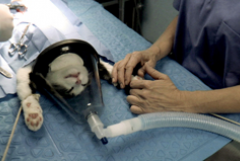
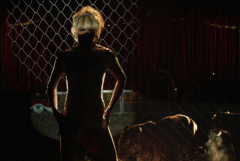
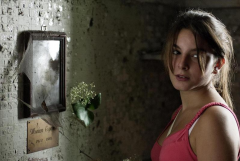
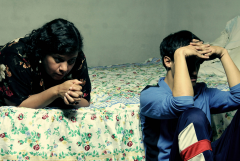
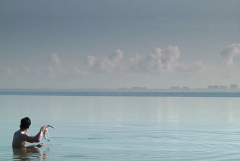
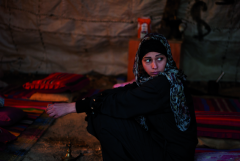

 Vous consultez les archives de l'édition 2012 du Festival du Film
Vous consultez les archives de l'édition 2012 du Festival du Film


